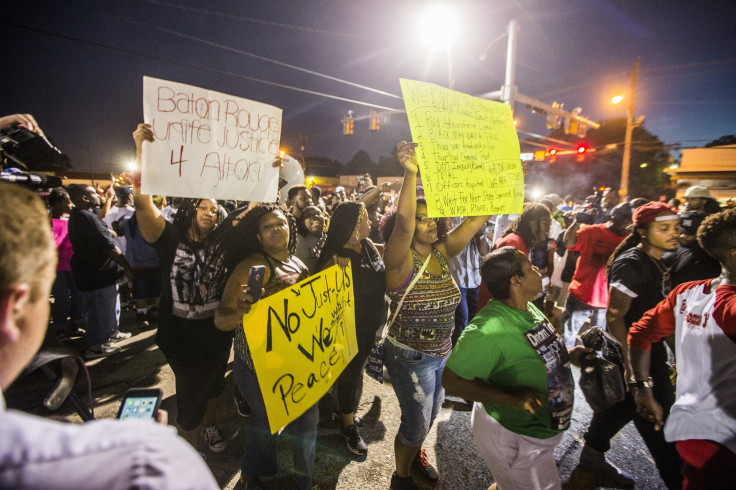Black Lives Matter Activists Continue Protests After Dallas Shooting, Philandro Castile And Alton Sterling Deaths

Activists and social justice groups across the U.S. were moving forward with anti-police brutality protests and community events this week after two unarmed black men were killed by police and a lone gunman attacked a crowd of police officers in Dallas. Organizers such as Daunasia Yancey, founder of the Boston chapter of Black Lives Matter, said the events represent an opportunity to heal wounds and demand justice through non-violence.
"It’s not just protesting, it’s not just voting, it’s all of these things and also hearing ourselves and processing the trauma, the secondary trauma we deal with and being able to talk about what is going on and how it affects us on the day to day," she said in a phone interview Friday.
Police killed Alton Sterling, 37, in Baton Rouge, Louisiana, Tuesday in a fatal shooting that was captured on video by a bystander. The next day Philando Castile, 32, was killed in Falcon Heights outside of St. Paul, Minnesota, and his girlfriend shared the aftermath of the shooting in real time on Facebook. Hours later, as protesters gathered Thursday night in cities across the nation to protest excessive police force, Micah Johnson, 25, opened fire on a peaceful demonstration in Dallas, killing five police officers and wounding others.
After the massacre, members of both the Castile and Sterling families called on peaceful protesters to continue to draw attention to police violence in the U.S. In Baton Rouge, black community members planned a meeting Friday night for the community’s young black men to discuss Sterling’s death, peaceful actions and the status of the investigation.
"We are trying to give them some encouragement because when you look at what happened here and in Minnesota, we have conversations with our young men on how to act, but it just seems like no matter what you do, too many young black men are ending up on the other side and becoming hashtags," said state Rep. Edward C. James of Baton Rogue, who was scheduled to attend the event.
#ShutItDown NYC. Enough is enough pic.twitter.com/KKDx9Aqc5w
— Kimya Zahedi (@Kimyazahedi) July 8, 2016
As investigators in Dallas scrambled Friday to put together the events that lead to Thursday's mass shooting, marches continued to unfold across the nation, with demonstrators seeking to drive the national debate on police brutality and racism. In New York City, supporters of the Black Lives Matter social justice movement chanted as they walked through crowded streets. In California, rappers Game and Snoop Dogg led a peaceful unification march with members of the Los Angeles Police Department.
"The mission is to reintroduce our community to the LAPD…just to get some understanding and dialogue," Snoop Dogg told the Los Angeles Times.
The Black Lives Matter Network discouraged critics Friday from linking the movement that seeks to reform the criminal justice system and promote racial equality with the shooting in Dallas.
"Black activists have raised the call for an end to violence, not an escalation of it. Yesterday’s attack was the result of the actions of a lone gunman," the statement said. "To assign the actions of one person to an entire movement is dangerous and irresponsible. We continue our efforts to bring about a better world for all of us."
In Massachusetts, Black Lives Matter Boston, Black Lives Matter Cambridge and We Are The Ones planned to unite and host a community-based event Friday evening to allow people to grieve and talk about the violence.
"The movement is definitely growing," Yancey said. "Even in the face of continued tragedy after tragedy that we are now seeing in social media and on video we continue to fight and I think the movement is just getting stronger."
Yancey and other activists are potentially anticipating more hostility after the shooting in Dallas brought extreme reactions on social media. Among them was former Republican U.S. Rep. Joe Walsh of Illinois, who tweeted late Thursday, "This is a war. Watch out Obama. Watch out black lives matter punks. Real America is coming after you." The tweet was later deleted.
But organizers said the heightened tensions could also further fuel a movement that has seen massive protests after the police killings of young black men, including Freddie Gray in Baltimore and Michael Brown in Ferguson, Missouri.
"Every city, it seems like, has their own Freddie Gray, has their own incident that sparks this conversation. Every city is on a different road, some cities are further down the road than others, others are just starting down the road. In Baltimore, we are trying to push towards very clear structural reforms in the way police accountability happens," said Lawrence Grandpre, assistant director for research and public policy for Leaders of a Beautiful Struggle, a grassroots think tank that focuses on public policy in Baltimore. "I think that the movement is beginning to crystalize."
© Copyright IBTimes 2024. All rights reserved.












